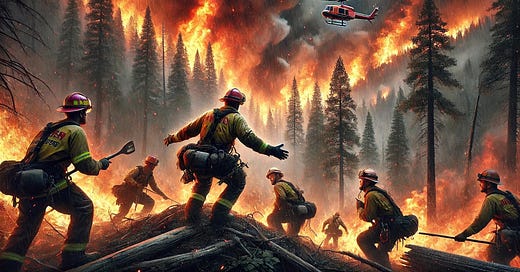The Deadly Cost of Holding On: Lessons from the Mann Gulch Tragedy
How Human Psychology and Unyielding Habits Can Turn Crisis into Catastrophe
Have you ever questioned why people act the way they do in a crisis? We often wonder, "Would I have made a different decision in their place?" It's easy to assume the outcome would have changed if only they'd been better trained or more prepared.
But there's a deeper truth we often overlook.
The Mann Gulch Tragedy: A Sobering Case Study
The Mann Gulch fire, a wildfire that erupted in Montana, offers a powerful lesson in the complexities of decision-making under extreme stress. Fifteen smokejumpers parachuted into what they thought would be a routine firefight, but they were soon confronted by a firestorm fueled by unexpected high winds. In just ten minutes, the fire exploded across 3,000 acres, leaving the firefighters with a stark choice: drop their tools and run or face the flames.
Tragically, 13 of them—including 12 smokejumpers—did not survive. Of the three who escaped, none dropped their tools, despite being instructed to do so. This harrowing event forces us to reflect on the psychological forces at play in life-or-death situations and the potential consequences of our deeply ingrained habits.
Why Didn’t They Drop Their Tools?
While many factors contributed to the tragic loss of life, one stands out: the refusal of the firefighters to drop their tools. Studies suggest multiple reasons for this, including confusion, mistrust of leadership, and the inability to hear or process commands amid the chaos. However, the most compelling explanation lies in how these men viewed themselves and their tools—a relationship forged by training, habit, and the pressure of the moment.
Training and Habit: These firefighters were conditioned to see their tools as essential to their survival. In the face of an advancing fire, their instinct was to cling to what they knew best.
Psychological Inertia: Under stress, people often stick to familiar behaviors. The tools symbolized security and control in an uncontrollable situation. Letting go of them required a mental shift that was nearly impossible in the heat of the moment.
Breakdown in Communication and Leadership: When the foreman, Wagner "Wag" Dodge, recognized the dire situation and lit an escape fire, his decision wasn’t fully understood by his crew. The lack of clear communication meant that the firefighters didn’t grasp the urgency of dropping their tools to save their lives.
Cognitive Overload: The extreme stress of the situation impaired decision-making. The firefighters were so focused on survival that dropping their tools—a logical but counterintuitive action—likely never crossed their minds.
These factors combined to create a perfect storm where their training and instincts, instead of saving them, contributed to the tragedy.
What Can We Learn from Mann Gulch?
The Mann Gulch fire is not just a historical event; it’s a cautionary tale with lessons that apply to many aspects of life, from business to leadership to personal decision-making.
- Adaptability and Flexibility: Clinging to established practices can be deadly in rapidly changing situations. Success often requires the courage to abandon familiar tools or methods and adapt on the fly.
- The Critical Role of Communication: In any crisis, clear communication is vital. Leaders must ensure their strategies are understood by everyone involved. A communication breakdown can have catastrophic consequences.
- Challenge Assumptions: The firefighters’ assumption that their tools were indispensable was never questioned, even as the situation changed. Regularly reassessing assumptions in the face of new information is crucial for making sound decisions.
- Leadership in Crisis: Effective leadership goes beyond making decisions—it requires ensuring those decisions are communicated and understood. Leaders must be willing to take and explain unconventional actions if they are the best course of action.
- Training for the Unexpected: While training is essential, it must also prepare individuals for the unexpected. This includes making quick, unconventional decisions when reality deviates from the norm.
- Cognitive Biases: The Mann Gulch fire highlights the danger of cognitive biases, like the "sunk cost fallacy" or "groupthink," which can cloud judgment in high-stress situations. Recognizing and mitigating these biases is critical.
- The Human Element in Decision-Making: Understanding human psychology is vital for effective decision-making, especially in crises. Tools, training, and environments that foster clear thinking under pressure can make all the difference.
These lessons underscore the importance of adaptability, communication, leadership, and psychological awareness in any high-pressure situation. So, while it might seem obvious to drop your tools and run, remember: what seems clear in hindsight may be far from obvious in the heat of the moment. Would you know better or is that just a story you are telling yourself?




